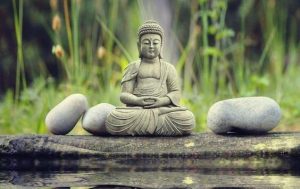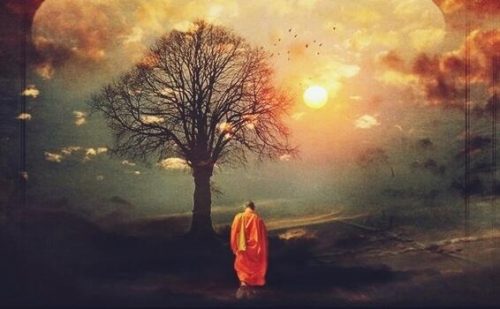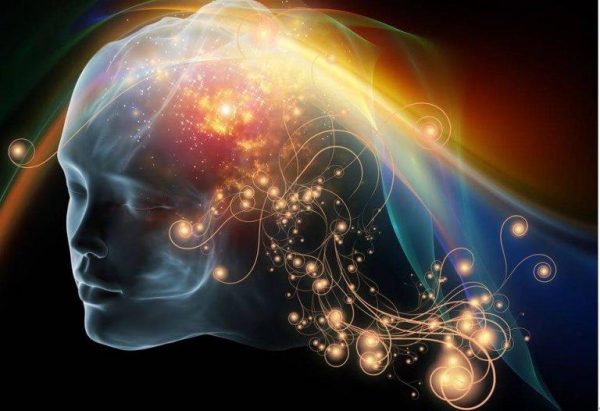Asian Wisdom: the Depths and the Background

The depths and the background are concepts that appear in various oriental philosophies of Asian wisdom. One has given way to what is known as the “psychology of self-knowledge”. In this field, the different levels of consciousness and their interactions among each other are important. They believe that when these levels are conquered, a state of well-being is achieved.
This isn’t a focus of scientific study, strictly speaking. Even so, the similarities of Asian wisdom with Western knowledge are interesting. Even more when many of these concepts, such as background and beyond, are millennia old. Because of this, it is fascinating that they are so closely related to what in the western world are called schools of psychology.
“Conscience is the voice of the soul. Passions are the voice of the body”.
-William Shakespeare-
Here as much as there, the conscious mind holds an essential place. The final objective in both the Orient and Occident is a higher level of awareness. The implicit idea is shared that ignorance is the source of errors and unhappiness. Because of that, well-being is found in self-knowledge. Its expression is in consciousness. Let’s take a deeper look at this.
Forms and life
For the so-called “psychology of self-knowledge”, the world of forms is the world of the apparent. This is related to everyday life. What we see and perceive daily. Objects, places, and situations with which we have to struggle permanently. This corresponds to what in the West we call “perception”. Contact with reality is made through the senses.

The Oriental point-of-view says that this dimension includes our habitual behaviors. This is what we tend to show of ourselves to the world. Our routines and the way in which we relate with others on a daily basis. The world of forms is one of deceit because it only allows us to see the surface. Perception in the West is also seen as a primary level of knowledge. It easily leads one to error.
The depths – a grey area
According to Asian philosophy, the depths correspond to an area of our being where our unconscious thoughts lie. In particular, it is there where problematic aspects of ourselves, such as complexes and phobias, reside. It corresponds to what we call “the preconscious” in the West. That is to say, it is all we intuit about ourselves, but we don’t know consciously.
Asian wisdom says that the depths have very dense vibrations. These have repercussions in how we perceive ourselves and how we relate to others. They condition a great deal of our behavior. The greater part of our fears, worries, and weaknesses are there. You can only transcend this through self-knowledge.
The background – the world of the unknown
The focus of Eastern philosophy is to say that the background is the most profound and unknown region of all humans. Nevertheless, that is where a dark force and a force of light reside. All of the vices and defects are in the dark zone. The greatest virtues of each human being are in the light zone.

In the background, then, you can find the most profound reasons for all of your behavior. Shortcomings are the forces that limit your growth. They work as a hidden energy that makes you act destructively. They can happen without you ever knowing why or how.
For their part, virtues are those that emerge in times of extremes. They become proof of our greatness. The concept of the background corresponds to what Western thought denotes the “unconscious”.
The depths and the background: the conscious mind
This point-of-view assets that when you are able to establish harmony, greater consciousness emerges. It can also be done through the joining of depths and background. This is the fruit of self-knowledge. It permits the greatest values of humanity to reach full breadth. It corresponds to the highest achievement in life. By extension, it leads to happiness.
The depths and the background are two levels of consciousness through which we constantly move. When they are brought into harmony many values are developed. These include love, sincerity, empathy, bravery, humility, spirituality, and fraternity, among others. In sum, all of the values which are highly constructive. Both for yourself and for others.

It is interesting to observe how Eastern philosophies lend great value to preconscious or unconscious wisdom. That is to say, that which resides in the depths and in the background. It’s not pure reason which brings one to truth and well-being. Rather, it’s reason that’s applied to all that is learned. This stays latent in those grey and dark zones within us.
In closing, in the East, they also put great value of one of the maxims that founded Western Culture: “know thyself”. They are separated by great distances and dissonance in time. However, there are finally many aspects for the which the conclusions are the same.
The depths and the background are concepts that appear in various oriental philosophies of Asian wisdom. One has given way to what is known as the “psychology of self-knowledge”. In this field, the different levels of consciousness and their interactions among each other are important. They believe that when these levels are conquered, a state of well-being is achieved.
This isn’t a focus of scientific study, strictly speaking. Even so, the similarities of Asian wisdom with Western knowledge are interesting. Even more when many of these concepts, such as background and beyond, are millennia old. Because of this, it is fascinating that they are so closely related to what in the western world are called schools of psychology.
“Conscience is the voice of the soul. Passions are the voice of the body”.
-William Shakespeare-
Here as much as there, the conscious mind holds an essential place. The final objective in both the Orient and Occident is a higher level of awareness. The implicit idea is shared that ignorance is the source of errors and unhappiness. Because of that, well-being is found in self-knowledge. Its expression is in consciousness. Let’s take a deeper look at this.
Forms and life
For the so-called “psychology of self-knowledge”, the world of forms is the world of the apparent. This is related to everyday life. What we see and perceive daily. Objects, places, and situations with which we have to struggle permanently. This corresponds to what in the West we call “perception”. Contact with reality is made through the senses.

The Oriental point-of-view says that this dimension includes our habitual behaviors. This is what we tend to show of ourselves to the world. Our routines and the way in which we relate with others on a daily basis. The world of forms is one of deceit because it only allows us to see the surface. Perception in the West is also seen as a primary level of knowledge. It easily leads one to error.
The depths – a grey area
According to Asian philosophy, the depths correspond to an area of our being where our unconscious thoughts lie. In particular, it is there where problematic aspects of ourselves, such as complexes and phobias, reside. It corresponds to what we call “the preconscious” in the West. That is to say, it is all we intuit about ourselves, but we don’t know consciously.
Asian wisdom says that the depths have very dense vibrations. These have repercussions in how we perceive ourselves and how we relate to others. They condition a great deal of our behavior. The greater part of our fears, worries, and weaknesses are there. You can only transcend this through self-knowledge.
The background – the world of the unknown
The focus of Eastern philosophy is to say that the background is the most profound and unknown region of all humans. Nevertheless, that is where a dark force and a force of light reside. All of the vices and defects are in the dark zone. The greatest virtues of each human being are in the light zone.

In the background, then, you can find the most profound reasons for all of your behavior. Shortcomings are the forces that limit your growth. They work as a hidden energy that makes you act destructively. They can happen without you ever knowing why or how.
For their part, virtues are those that emerge in times of extremes. They become proof of our greatness. The concept of the background corresponds to what Western thought denotes the “unconscious”.
The depths and the background: the conscious mind
This point-of-view assets that when you are able to establish harmony, greater consciousness emerges. It can also be done through the joining of depths and background. This is the fruit of self-knowledge. It permits the greatest values of humanity to reach full breadth. It corresponds to the highest achievement in life. By extension, it leads to happiness.
The depths and the background are two levels of consciousness through which we constantly move. When they are brought into harmony many values are developed. These include love, sincerity, empathy, bravery, humility, spirituality, and fraternity, among others. In sum, all of the values which are highly constructive. Both for yourself and for others.

It is interesting to observe how Eastern philosophies lend great value to preconscious or unconscious wisdom. That is to say, that which resides in the depths and in the background. It’s not pure reason which brings one to truth and well-being. Rather, it’s reason that’s applied to all that is learned. This stays latent in those grey and dark zones within us.
In closing, in the East, they also put great value of one of the maxims that founded Western Culture: “know thyself”. They are separated by great distances and dissonance in time. However, there are finally many aspects for the which the conclusions are the same.
This text is provided for informational purposes only and does not replace consultation with a professional. If in doubt, consult your specialist.







